Did you know that the Catholic Church formally condemns
the false opinion, “The Church must be separated from the State, and the
State from the Church”?[1] Did you know that the Catholic Church calls the
separation of Church and State “a fatal theory”?[2] And that to banish
religion from the laws and from society is "a grave and fatal error”?[3]
In a New York Newsday article entitled,
“No puppet of Pope, Kerry says,”
Senator Kerry was quoted as saying:
“We have a separation of
church and state in this country,” said the Massachusetts Democrat, who would
be the nation’s second Catholic commander in chief if elected. “I don’t tell
church officials what to do, and church officials shouldn’t tell American
politicians what to do in the context of our public life.”
The Church will never accept
“practices and doctrines which a perversion of morals and a warped judgment have
unlawfully introduced”,[4] such as the legalization of abortion. Also, the
Church insists that governments “should be constituted without involving wrong
to any one.”[5] Furthermore, harmony should exist between Church and State:
“This harmony has been not inaptly compared to that which exists between the
body and the soul for the well-being of both one and the other, the separation
of which brings irremediable harm to the body, since it extinguishes its very
life.”[6]
John Adams, just 21 days before he signed the Declaration of Independence,
wrote:
“Statesmen, my dear sir,
may plan and speculate for liberty, but it is religion and morality alone,
which can establish the principles upon which freedom can securely stand. The
only foundation of a free Constitution is pure virtue, and if this cannot be
inspired into our people in a greater measure, than they have it now, they may
change their rulers and the forms of government, but they will not obtain a
lasting liberty.”
Unfortunately, many of our
government leaders, including Senator Kerry, do not believe this.
In this article we wish to
(1) show that the United States was founded as a Christian nation, by Christian
leaders; and (2) emphasize that absolute separation of Church and State never
existed in the United States, nor was this ever the intention of the American
Founders.
Christianity and the United States
Patrick Henry writes, “It cannot be emphasized too strongly or too often that
this great nation was founded, not by religionists, but by Christians, not on
religions, but on the Gospel of Jesus Christ.” The U.S. Constitution was founded
on biblical principles and had 55 people work upon it, of which 52 were
Christians.[7]
The Father of our country, George Washington, publicly acknowledged God and
rejected the error of separating religion from politics. In his First Inaugural
Address he stated, “It would be peculiarly improper to omit in this first
official act my fervent supplications to that Almighty Being who rules over the
universe, who presides in the councils of nations, and whose providential aids
can supply every human defect….” Soon afterwards he addressed his Catholic
fellow citizens in these words:
“I presume that your
fellow-citizens will not forget the patriotic part which you took in the
accomplishment of their revolution, and the establishment of their government,
or the important assistance they received from a nation in which the Roman
Catholic faith is professed.”[8]
George Washington proclaimed
that all nations have a duty to publicly acknowledge God: “Whereas it is the
duty of all nations to acknowledge the providence of Almighty God, to obey His
will, to be grateful for His benefits, and humbly to implore His protection and
favor….”[9] Almost one hundred years later, President Abraham Lincoln emphasized
that “it is the duty of nations as well as men to own their dependence upon the
overruling power of God”.[10] James Madison, fourth President of the United
States, wrote:
“We have staked the whole
future of American civilization not upon the power of government, far from it.
We have staked the future of all our political institutions upon the capacity
of each and all of us to govern ourselves according to the Ten Commandments of
God.”
He also stressed:
“The future and success of
America is not in this Constitution, but in the laws of God upon which this
Constitution is founded.”
These presidential
statements conform to the Church’s teaching, as proclaimed by Pope Leo XIII:
“…civil society must acknowledge God as its Founder and Parent, and must obey
and reverence His power and authority. Justice therefore forbids, and reason
itself forbids, the State to be godless….”[11]
The Christian foundation of the United States was the Founders’ glory. In the
words of President John Quincy Adams, “The highest glory of the American
Revolution was this: that it connected, in one indissoluble bond, the principles
of civil government with the principles of Christianity.”[12]
In order to determine the reason for America’s success in its democracy, the
French writer Alexis de Tocqueville was commissioned by the French government to
travel to the United States. After visiting the United States in 1831, he wrote:
“Religion in America …
must be regarded as the foremost of the political institutions of that
country; for if it does not impart a taste for freedom, it facilitates the use
of it. Indeed, it is in this same point of view that the inhabitants of the
United States themselves look upon religious belief. I do not know whether all
Americans have a sincere faith in their religion—for who can search the human
heart?—But I am certain that they hold it to be indispensable to the
maintenance of their Republican institutions. This opinion is not peculiar to
a class of citizens or a party, but it belongs to the whole nation and to
every rank of society.”
In a similar vein G. K.
Chesterton wrote, “America is the only nation in the world that is founded on a
creed. That creed is set forth with dogmatic and even theological lucidity in
the Declaration of Independence.”[13]
“Fatal theory” of separation of Church and
State
George Washington, who presided over the Constitutional Convention, said, “If I
could have entertained the slightest apprehension that the Constitution framed
at the Convention, where I had the honor to preside, might possibly endanger the
religious rights of any ecclesiastical Society, certainly I would not have
placed my signature on it.”[14]
The first Chief Justice of the Supreme Court, John Jay, wrote:
“Providence has given to
our people the choice of their rulers, and it is the duty ... of our Christian
nation to select and prefer Christians for their rulers.” (1816)
Justice David Brewer stated:
“This is a religious
people. This is historically true. From the discovery of this continent to the
present hour, there is a single voice making this affirmation…. We find
everywhere a clear recognition of the same truth…. These, and many other
matters which might be noticed, add a volume of unofficial declarations to the
mass of organic utterances that this is a Christian nation.” (1892)
The controversial statement
about a wall of separation between church and state was made by Thomas Jefferson
in a letter on January 1, 1802 to the Danbury Baptist Association of
Connecticut. The context of this statement was that the Danbury Baptists had
heard a widespread rumor that the Congregationalists were to become the national
religion. This was very alarming to people who knew about religious persecution
in England. He wrote:
“I contemplate with solemn
reverence that act of the whole American people which declared that their
legislature should ‘make no law respecting an establishment of religion, or
prohibiting the free exercise thereof,’ thus building a wall of separation
between Church and State.”
This wall was to keep the
government out of religion, but would ensure that Christian principles would
always remain in American government.
The 1978 Supreme Court case McDaniel v. Patyark emphasized the rights of
citizens of faith:
“The Establishment Clause
does not license government to treat religion, and those who teach or practice
it, simply by virtue of their status as such, as subversive of American ideals
and therefore subject to unique disabilities ... In short, government may not
as a goal promote “safe-thinking” with respect to religion and fence out from
political participation those, such as ministers, whom it regards as
over-involved in religion. Religionists no less than members of any other
group enjoy the full measure of protection afforded speech, association, and
political activity generally. The Establishment Clause, properly
understood, is a shield against any attempt by government to inhibit religion
... it may not be used as a sword to justify repression of religion or its
adherents from any aspect of public life.”
George Washington himself
warned, “Do not let anyone claim to be a true American if they ever attempt
to remove religion from politics.” This is the true role that Christianity
played in the founding and growth of the United States.
Not only is absolute separation of Church and State un-American, it is also an
error that is promoted by the communists. This interesting fact will shed
a great deal of light:
“This phrase [separation
of Church and State] does not appear in our Constitution or any of our
country’s official documents. It does, however, appear in another prominent
document, the Constitution of the former Soviet Union: ‘The church in the
U.S.S.R. is separated from the state and the school from the church.’(Article
52)”[15]
It is worth repeating that
the Catholic Church, through Pope Leo XIII and Pope Pius IX, formally condemned
the separation of Church and State as an error and "a fatal theory". It
is plainly obvious why it is an error. Currently in the United States murder of
the unborn for the sake of convenience is considered a personal “freedom”,
prayer is outlawed in public schools, and the fatal theory of separation of
church and state has been and is being used as a weapon to remove Christianity
from the public sector.
The Bible clearly states, “There is not power but from God” (Rom 13:1). All
power comes from God and according to His providential plan, legitimate rulers
participate in God’s power over the world. The Church states that it is an
absurdity for the commands of God to be disregarded in the framing of laws:
“There are others,
somewhat more moderate though not more consistent, who affirm that the
morality of individuals is to be guided by the divine law, but not the
morality of the State, for that in public affairs the commands of God may be
passed over, and may be entirely disregarded in the framing of laws. Hence
follows the fatal theory of the need of separation between Church and State.”[16]
Pope Leo XIII continues:
“But the absurdity of such
a position is manifest. Nature herself proclaims the necessity of the State
providing means and opportunities whereby the community may be enabled to live
properly, that is to say, according to the laws of God. For, since God is the
source of all goodness and justice, it is absolutely ridiculous that the
State should pay no attention to these laws or render them abortive by
contrary enactments.”[17]
It is absurd to claim a
“right” to murder the unborn for personal convenience. According to Church
teaching, the Roe v. Wade ruling is no law but an usurpation of law, where the
Supreme Court arrogated to itself power to permit what no man can permit: the
murder of the innocent. Pope John Paul II states in his encyclical, The
Gospel of Life:
“The legal toleration of
abortion or of euthanasia can in no way claim to be based on respect for the
conscience of others, precisely because society has the right and the duty to
protect itself against the abuses which can occur in the name of conscience
and under the pretext of freedom.”
Robert Bork explains that
the Supreme Court Justices in Roe v. Wade “invented a heretofore
unheard-of constitutional right to ‘personal dignity and autonomy.’”[18] Bork
also writes:
“Roe and the
decisions reaffirming it are equal in their audacity and abuse of judicial
office to Dred Scott v. Sanford. Just as Dred Scott forced a
southern pro-slavery position on the nation, Roe is nothing more than
the Supreme Court’s imposition on us of the morality of our cultural elites.”
George Washington emphasized
in his Farewell Address, “Of all the dispositions and habits which lead to
political prosperity, religion and morality are indispensable supports.” The
wisdom of morality for the good of society is common sense.
Government leaders who pay no attention to God’s law abuse political power:
“Besides, those who are in
authority owe it to the commonwealth not only to provide for its external
well-being and the conveniences of life, but still more to consult the welfare
of men’s souls in the wisdom of their legislation. But, for the increase of
such benefits, nothing more suitable can be conceived than the laws which have
God for their author; and, therefore, they who in their government of the
State take no account of these laws abuse political power by causing it to
deviate from its proper end and from what nature itself prescribes.”[19]
Similarly, President George
Washington stated: “We ought to be no less persuaded that the propitious smiles
of Heaven can never be expected on a nation that disregards the eternal rules of
order and right which Heaven itself has ordained….”[20]
Justice Rehnquist: U.S. not founded on
absolute Church-State separation
In the 1985 Supreme Court case Wallace v. Jaffree, Justice William
Rehnquist dissented from the majority opinion and explained in very detailed
historical terms the fact that an absolute Church-State separation never existed
in the United States. He explained that the framers of the First Amendment
(including the chief framer, James Madison), merely had in mind that the United
States government should not establish a national religion. He referred back to
the Court’s own words thirty-eight years previous, which said:
"In the words of
Jefferson, the clause against establishment of religion by law was intended to
erect ‘a wall of separation between church and State.’ Reynolds v. United
States, [98 U.S. 145, 164, 25 L.Ed. 244 (1879)]."
Rehnquist then went on to
give several proofs that there never was an absolute separation of Church and
State, and that the following incidents could never have occurred if such was
the case.
The language that James Madison first proposed for what ultimately became the
Religion Clauses of the First Amendment reads as follows:
“The civil rights of none
shall be abridged on account of religious belief or worship, nor shall any
national religion be established, nor shall the full and equal rights of
conscience be in any manner, or on any pretext infringed.”
Several revisions followed,
until the final version was agreed upon. Clearly, Madison saw the First
Amendment as designed to prohibit the government from establishing of a national
religion. As Rehnquist noted, “He did not see it as requiring neutrality on the
part of government between religion and irreligion.”
Rehnquist mentioned that “the actions of the First Congress, which reenacted the
Northwest Ordinance for the governance of the Northwest Territory in 1789,
confirm the view the Congress did not mean that the government should be neutral
between religion and irreligion.” This ordinance provided that “[r]eligion,
morality, and knowledge, being necessary to good government and the happiness of
mankind, schools, and the means of education shall forever be encouraged.”
Rehnquist also referred to Joseph Story, a member of the Supreme Court from 1811
to 1845, who published one of the most comprehensive studies of the United
States Constitution that had appeared to that date. In Volume 2 of Story’s
Commentaries on the Constitution of the United States, he discussed the
meaning of the Establishment Clause of the First Amendment:
“Probably at the time of
the adoption of the Constitution, and of the amendment to it now under
consideration [First Amendment], the general if not the universal sentiment in
America was, that Christianity ought to receive encouragement from the State
so far as was not incompatible with the private rights of conscience and the
freedom of religious worship. An attempt to level all religions, and to make
it a matter of state policy to hold all in utter indifference, would have
created universal disapprobation, if not universal indignation.” (pp. 630-632)
Story also wrote:
“The real object of the
[First] Amendment was not to countenance, much less to advance, Mahometanism,
or Judaism, or infidelity, by prostrating Christianity, but to exclude all
rivalry among Christian sects, and to prevent any national ecclesiastical
establishment which should give to a hierarchy the exclusive patronage of the
national government.“
Clearly, the First Amendment
was not meant to advance infidelity to God. According to Chief Judge Hand, “at
the turn of the century, for example, no person who denied the existence of God
could hold offices in such states as Arkansas, Mississippi, Texas, North
Carolina, or South Carolina.”
Thomas Cooley, a legal authority whose eminence rivaled that of Story, stated
the following in his treatise Constitutional Limitations:
“But while thus careful to
establish, protect, and defend religious freedom and equality, the American
constitutions contain no provisions which prohibit the authorities from such
solemn recognition of the superintending Providence in public transactions and
exercises as the general religious sentiment of mankind inspires, and as seems
meet and proper in finite and dependent beings. Whatever may be the shades of
religious belief, all must acknowledge the fitness of recognizing in important
human affairs the superintending care and control of the Great Governor of the
Universe, and of acknowledging with thanksgiving His boundless favors, or
bowing in contrition when visited with the penalties of his broken laws. No
principle of constitutional law is violated when thanksgiving or fast days are
appointed; when chaplains are designated for the army and navy; when
legislative sessions are opened with prayer or the reading of the Scriptures,
or when religious teaching is encouraged by a general exemption of the houses
of worship from taxation for the support of State government.”[21]
One of the earliest acts of
the first House of Representatives was to elect a chaplain. James Madison, who
was a member of the Congressional committee, recommended the chaplain system. On
May 1, 1789, the House elected as chaplain the Reverend William Linn,
appropriating money from the federal treasury to pay his salary. Had James
Madison believed in the absolute separation of Church and State, he would
certainly have objected to the election of a chaplain.[22]
In 1782, the United States Congress voted for this resolution: “The Congress of
the United States recommends and approves the Holy Bible for use in all
schools.”
Referring to Jefferson’s letter, Justice William Rehnquist warns that the
“greatest injury of the ‘wall’ notion is its mischievous diversion of judges
from the actual intentions of the drafters of the Bill of Rights.” He also
emphasizes that
“The Establishment Clause
did not require government neutrality between religion and irreligion nor did
it prohibit the Federal Government from providing nondiscriminately aid to
religion. There is simply no historical foundation for the proposition that
the Framers intended to build the ‘wall of separation’ that was
constitutionalized in Everson.”
Restore America to “one nation under God”
The United States owes her greatness to the goodness of Almighty God, who has
showered our country with so many blessings throughout its history. Pope Leo
XIII wrote, “Reason shows, and history confirms the fact, that the higher the
morality of States, the greater are the liberty and wealth and power which they
enjoy.”[23]
We must be aware what is happening to our country. Dr. James Dobson of Focus on
the Family warns that an “objective of the revisionists is to convince the
American people that Christians, specifically those with conservative
inclinations, are in violation of the Constitution whenever they advocate their
views beyond the front doors of their sanctuaries.” Dr. Dobson at the same time
is hopeful:
“Fortunately, those who
would rid us of our spiritual heritage have an impossible task on their hands.
To sanitize our history, it would be necessary to expunge all official
records, burn old textbooks, close the Library of Congress, destroy the
existing diaries and letters and sandblast half the buildings in Washington,
D.C. And still the evidences of our faith would exist. An image of Moses faces
the Speaker of the House of Representatives; our coins proclaim ‘In God We
Trust’; our Pledge of Allegiance declares that we are ‘one nation, under God’;
our Declaration of Independence asserts that we are ‘endowed by the Creator
with certain unalienable rights’; the oath of office for the presidency ends
with the phrase ‘so help me God’; and on it goes.”
In conclusion, President
Woodrow Wilson stated:
“America was born a
Christian nation. America was born to exemplify that devotion to the elements
of righteousness which are derived from the revelations of the Holy
Scripture.”
References:
1. Pope Pius IX, Syllabus of Errors, December 8, 1864, #55.
2. Pope Leo XIII, Libertas, #18.
3. Pope Leo XIII, Immortale Dei, #32.
4. Libertas, #41.
5. Ibid., #41.
6. Ibid., #18.
7. M.E. Bradford, A Worthy Company: Brief Lives of the Framers of the United
States Constitution, pp. 4-5.
8. Quoted in Cardinal Gibbons, Faith of Our Fathers, pp. 197-198.
9. Thanksgiving Proclamation, October 3, 1789.
10. President Abraham Lincoln, “Proclamation for a day of Prayer and Fasting,”
March 30, 1863.
11. Libertas, #21.
12. July 4, 1821.
13. G.K. Chesterton, essay, “What I Saw in America.”
14. Reply to Virginia United Baptist Churches, May 10, 1789.
15. “Restoring the Christian Voice: Informational Fact Sheet,” Center for
Reclaiming America website.
16 Libertas, #18.
17 Ibid.
18. Robert H. Bork, Slouching Towards Gomorrah: Modern Liberalism and
American Decline, p. 103.
19. Libertas, #18.
20. George Washington, Inaugural Address, April 30, 1789.
21. Thomas Cooley, Constitutional Limitations, pp. 470-471.
22. See Jaffree v. Board of School Commissioners of Mobile County, 1983.
23. Libertas, #22.
“Learn a simple lesson from the past, My children. When the morals of a
country stare to go down into darkness, and the teachings turn from God to
man, that country will soon be ended. First the spiritual life and then the
material life of your country shall be destroyed.” - Jesus October 2,
1976
Directives
D103
-
Communism
 PDF
PDF
D134 -
U.S. Government
Leaders  PDF
PDF
D158
- America the Beautiful  PDF
PDF
D224 -
Restore
America to One Nation Under God
 PDF
PDF
D349 -
Socialism
 PDF
PDF
D353 -
Dark
Clouds Over America
 PDF
PDF
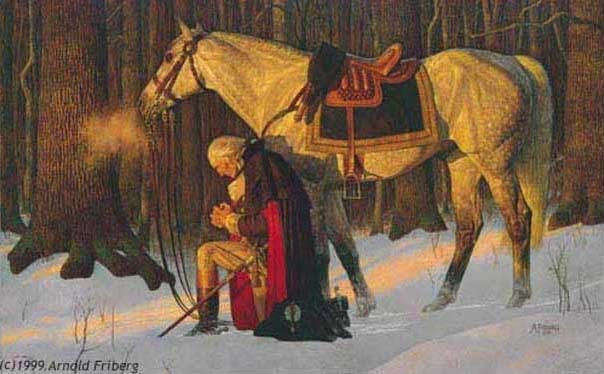
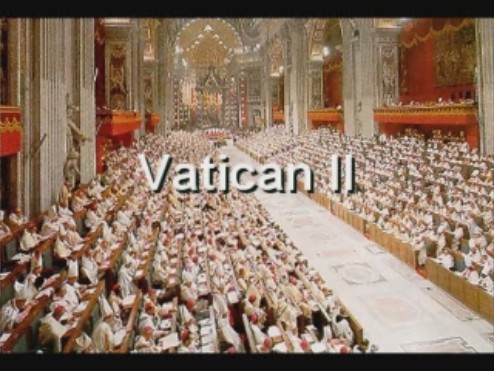 Vatican
II
Vatican
II World
Monetary Crash
World
Monetary Crash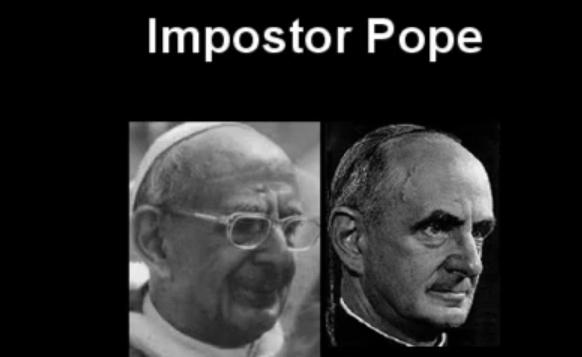 Deception
of the Century
Deception
of the Century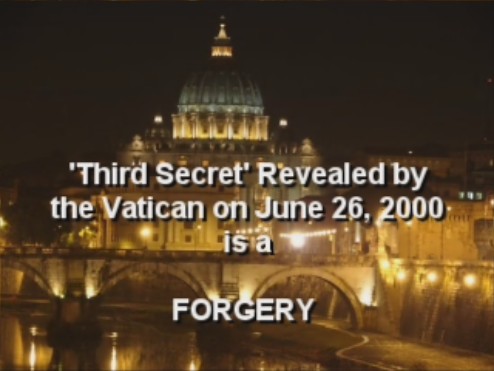 Third
Secret Fabrication
Third
Secret Fabrication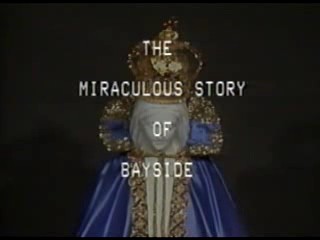 The
Miraculous Story of Bayside
The
Miraculous Story of Bayside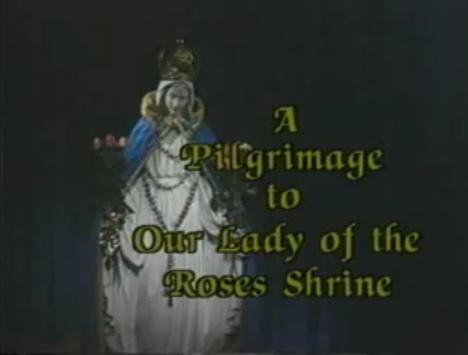 A
Pilgrimage to Our Lady of the Roses Shrine
A
Pilgrimage to Our Lady of the Roses Shrine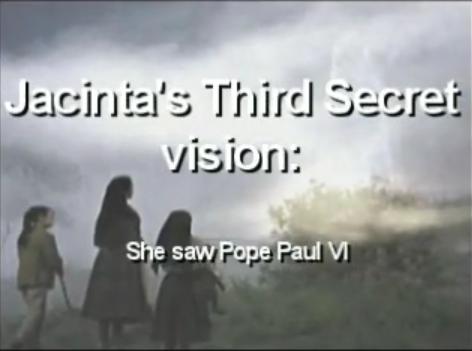 Jacinta's
Third Secret vision: She saw Pope Paul VI
Jacinta's
Third Secret vision: She saw Pope Paul VI